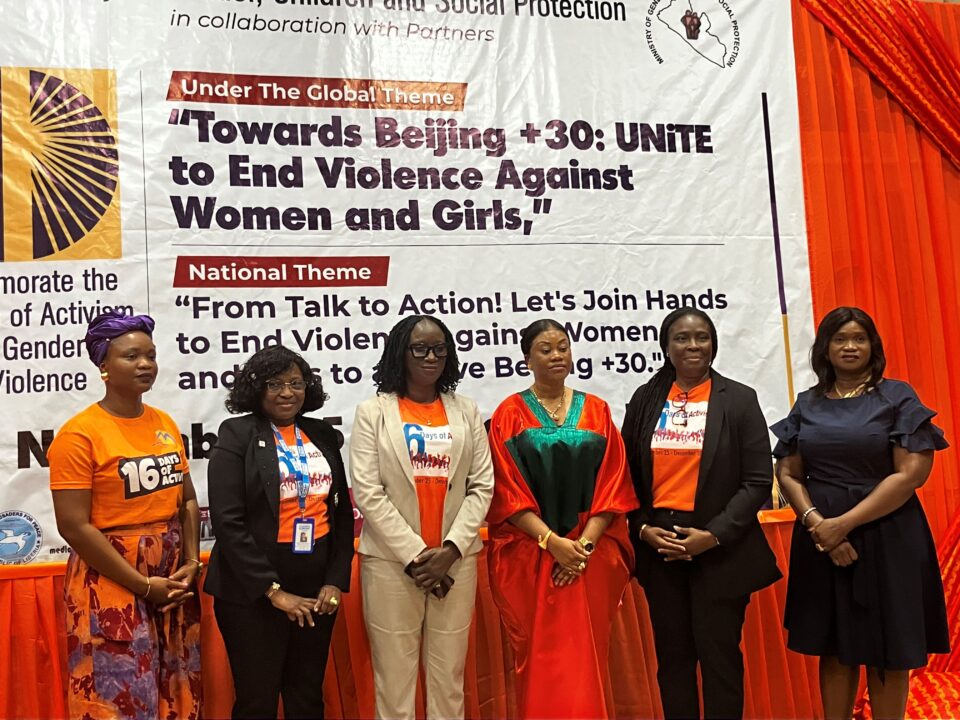The head of Medica Liberia Atty. Yah Vallah Parown has made an urgent appeal to the government of Liberia and its partners to focus more on actions and implementation to address Gender base violence and sexual gender base violence cases across Liberia.
Atty. Parown who is the Country Director for Medica Liberia made the disclosure when she served as key note speaker for the 16 Days Activism launch against gender base violence under the theme: From talk to action! Towards Beijing +30, unite to end violence against women and girls.
“This theme challenges us to confront hard truths, acknowledge our collective gains, responsibilities,”and take decisive action to end violence against women and girls Story Many years ago, I was visiting my sister in Tappita, Nimba County when I found myself stranded between Ganta and Tappita she added.
Explaining her experience with what she encountered years ago, she said, With no other options, I asked for a lift from an ambulance heading to Jackson F. Doe Memorial Hospital. Somewhere along the journey we came across a group of people, mostly women, gathered around something or rather, someone.
She further that, It turned out to be a pregnant woman, in labor, urgently needing to get to a health facility. This is one of many experiences/examples we see everyday. By chance, the ambulance was there at that critical moment.
Atty. Parown narrated that, The driver made the decision to turn back and take her to the Sacalapea Comprehensive Health Center. On our way back-we encountered another pregnant woman in labor, this time in an even more critical condition.
She had not been at the roadside earlier when we passed but had just been brought out by her family, who were desperately trying to figure out how to get her to the nearest health facility.
According to her, both women were brought into the ambulance. As we bumped along the rocky, uneven road, the conditions were stark: two women in labor, lying on the hard floor. I found myself holding my own stomach tightly.
“The ride was tense, and uncomfortable, but we made it safely to the health center.” Thankfully, both women gave birth, and their lives, along with their babies, were saved.
Madam Parown said, she couldn’t stop thinking: what if that ambulance had not been there by chance? What if there had been no one to transport those women to safety in time? This experience has stayed with me, not just for its urgency but for the deeper truths it reveals about the lives of women and girls in Liberia.
“Imagine The challenges faced by these rural women on that As we approach Beijing +30, let us be sobered by this truth: no country in the world has fully eradicated violence against women and girls. Globally,” one woman is killed every 10 minutes by an intimate partner or family member Atty. Parown told the gathering.
She added that Almost 1 in 3 women globally has been subjected to physical and/or sexual intimate partner violence, non-partner sexual violence, or both at least once in their lives.
Medica Liberia country Director further indicated that , Adolescent girls are more at risk of intimate partner violence than adult women. By the time they are 19 years old, almost 1 in 4 adolescent girls (24 per cent) who have been in a relationship have already been physically, sexually, or psychologically abused by a partner.
According to her, Studies show that prevalence of technology-facilitated gender-based violence rates range from 16 to 58% globally In 2020, for every 10 victims of human trafficking detected globally, four were adult women and two were girls.
Medica Liberia head expressed that, The ongoing global backlash against gender equality, along with the climate crisis and increasing conflict around the world, and the rise of new threats stemming from the rapid technological change, create additional challenges to ending violence against women In Liberia, the situation is equally alarming, with gender-based violence (GBV) persisting as one of the most pervasive violations of human rights.
Look! These statistics are not mere numbers.
They represent lives disrupted, potentials lost, and a society held back. Addressing SGBV is not optional-it is a legal and societal imperative.
It requires not just awareness but action, not just policies but implementation, and not just words but commitment. While these #s represent the problem, reflecting on Beijing 30+ is also about reflecting on the gains made in Liberia to GBV Firstly, to our Minster of Gender Children and Social Protection and your team, I commend your openness and commitment to collaborating with CSOs.
This positive step creates an inclusive and cooperative environment that is essential for progress.
However, with your demonstrated openness, we remain hopeful that this time will be different. Secondly, since the end of Liberia’s civil conflict, significant progress has been made in addressing GBV and in fulfillment of the Beijing platform for action.
These include legislative, institutional, and community efforts. Key achievements include the enactment of laws such as the Rape Law of 2005, the Domestic Violence Act of 2019, and the Land Rights Act of 2018, alongside the establishment of institutional structures like the GBV Crimes Unit, Women and Children Protection Sections (WACPs), and Criminal Court E.

